Displaying items by tag: Peter Malone's Movie Reviews
Ringleader, The/ The Case of the Bling Ring
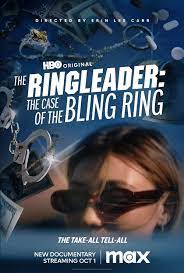
THE RINGLEADER: THE CASE OF THE BLING RING
US, 2023, 95 minutes, Colour.
Directed by Erin Lee Carr.
An American audience for this documentary might well remember the events of the late 2000s, the story of Los Angeles teenagers robbing the homes of celebrities like Lindsay Lohan, Orlando Bloom… The media called it The Bling Ring.
Audiences outside America might have come across this story through Sofia Coppola’s fiction film, based on the events and characters, The Bling Ring, featuring Katie Chang and Emily Watson.
Another documentary for television was made about The Bling Ring, featuring two of the central characters, Nick Prugo and Alexis Neiers who appeared on television sitcom, Pretty Wild. While the film offered the opportunity for interviews with these two, much of the reaction to the program was that they were very self-serving.
Erin Lee Carr has directed a number of documentaries on controversial events in American society, drug scandals, gymnastics scandals, murder cases, and Britney versus Spears.
This time the focus is on Rachel Lee, Korean American, the ringleader of the Bling Ring. While there is a great deal of footage from the past, her family, interviews with her father, her growing up, friends at school, footage of the robberies from surveillance cameras, police footage, the main part of the film is a lengthy interview with Rachel Lee herself, some years after the events and some years after her release from her prison term.
Again, the question can arise from viewers as to how much the interview is self-serving for Rachel Lee. As some kind of counterpoint, the scenes with Rachel Lee are intercut with interviews from journalists and, especially, detective investigators who are able to put more realistic point of view about the teenagers, the celebrities, the crimes, the handling of the issues by the media. Interestingly, one of the detectives who is into self-promotion, was associated with Sofia Coppola’s film, against regulations, harming aspects of the preparing of the case.
Which means then that the film is a close-up study of Rachel Lee herself, her understanding of herself, her explanations.
As with some of the other characters, there are speculations about the influence of family, Rachel’s absent mother, her professional gambler father (scenes of him in the flashbacks as well as the contribution to this documentary). There are the issues of family life, affluence or not, life in the hills outside Los Angeles, the preoccupation with celebrities, aspects of envy, and the temptation to robbery. Rachel, teenager, appears as the mastermind of the Bling Ring robberies, some interviews with her associates, especially Nick, the background to the online video maker, friendly than antagonistic towards Nick, the young women involved in the robberies.
And the focus is on the celebrity life of the targets of robbery, their appearance in the media, and the use of the Internet to find out where they would be, when their homes would not be occupied, the opulent life of some of them like Paris Hilton, the robberies, jewellery, clothes, storing them, at one stage a sale at Venice Beach, the cumulative effect of the experiences.
There are also sequences of their being tracked down, the arrests, Nick giving the information to the police, Rachel’s observation on her being sold out by him, the focus on the television celebrity and her arrest. The record cases, trials, sentences, modifications. There is Rachel, accepting her responsibility, long sentence, and being modified, her going to jail, the comments on her experience of broadening horizons, the self-centred, changing for her adult life.
The impact of the film will depend on audiences accepting Rachel Lee’s explanations herself, her self-examination, her attempts at honesty about herself, her judgements about her past, the effect of the experience on her and her future life.
Madeleine Collins
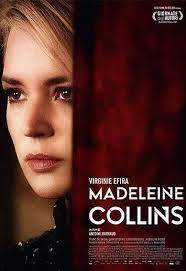
MADELEINE COLLINS
France, 2021, 104 minutes, Colour.
Virginie Efira, Quinn Gutierrez, Bruno Salamone, Jacqueline Bissett, François Rostain, Loise Benguerel.
Directed by Antoine Barraud.
Madeleine Collins doesn’t really appear in this film. That is part of a point made at the end of the film.
This is a film about identity, a film about someone who is present to two families. In films, this is usually a man with two families. This time it is a woman. And she is played by Virginie Efira, emerging in the last decade as one of France’s most significant and versatile actresses.
There is an opening sequence with the Virginie Efira in a dress shop, with money from her mother, trying on dresses, and collapsing with low blood pressure, then leaving the shop and the sound of a crash.
However, the main action takes place in the two households, one in Switzerland where Judith is in partnership with Abdel and his little daughter to whom she is devoted. She is a translator and has to go to various meetings. But, most often she goes to Paris to her other family, longtime husband who is an orchestra conductor, eager to advance his career, and with two teenage sons. On the one hand she has a happy domestic household. On the other, there is the glamour of the theatre, performances, socials, wealth, the buying a house.
Each of the men knows the name of the other but does not really know what is happening.
Which means that this is something of a psychological study of how Judith, also known as Margot, dependent on an admiring forger who is able to give her any identity she wants or he wants to give her (Madeleine Collins), the way she relates to each of the men in the families. It is also a story of deceit, cover, lies, becoming more and more complex and the possibilities of her being exposed. There are parents (and a welcome cameo by Jacqueline Bissett as her mother), there are clients who turn up unexpectedly…
This is a film for admirers of Virginie Efira and those intrigued by stories of coping with double households.
- The title? Area of mystery? Identity?
- The Swiss settings, homes? The Paris settings, concert and orchestra, socials? The musical score?
- The prologue, the visit to the store, looking at the dresses, trying them on, the collapse, low blood pressure, the aftermath and the accident? With reference to the rest of the film? To Judith that her character?
- A film about a double life, a middle-aged woman, her background, the visit of her parents and her relationship to them? Her marriage to Melvin, many years, his career, the two sons, the household, her travels, his travels, the scene of buying the house? The socials, the concerts, her leaving with her low blood pressure? Her friendship with the singer?
- The relationship with a Dell, Her relationship, the little girl, not married, their life together, a love for the little girl and devotion, a contrast with her other family?
- Judith and her work, translations, the jobs, seeing her in action, but her creating situations, her lies, travels? Going from one family to the other? The effect on her?
- Annabelle, the death of his wife, the birth of his daughter, the relationship with Judith, setting up a household, her devotion, love, his feeling our absences, bringing another woman home, Judith’s reactions? The visit of her parents? The other woman in the house? Their observations, the little girl calling out to Judith as her mother?
- Melville, his career, promotions, concerts, the growing separation? Doris and his observations, listening, his own secrets and orientation? His reaction to Judith?
- Juggling the two lives, the times, the travels, the passport, the forger and his devotion to her, saying she would have as many names as she wished, giving her a final card and name?
- The police, her upset, wanting documentation, her refusal? Picked up by her father?
- The chance encounter, the Canadian, her name is Marco, at the social, her awkwardness, Abdul and his reactions?
- Judith, her identity, the two families, separations, alienations, wanting her own life, identity?
Children of the Corn/ 2020
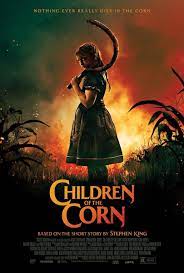
CHILDREN OF THE CORN
US, 2020, 93 minutes, Colour.
Elena Kampouris, Kate Moyer, Callan Mulvey, Bruce Spence, Stephen Hunter, Jayden McGinley, Andrew S.Gilbert.
Directed by Kurt Wimmer.
The first version of Children of the Corn was made in 1984, at the time when so many adaptations of Stephen King’s stories were being made, successfully so. And, this has continued in the succeeding decades, for cinema and television.
This is a rather slight Stephen King story. It has been written and directed by Kurt Wimmer, best known for writing action screenplays rather than for directing.
In some ways, this is an old-fashioned horror film, the setting up of the atmosphere of the cornfields and a strange presence, the threat to the cornfields by so much industrialisation and pesticides, the creation of a cornfields’ monster. And, there is the portrait of the small town in Nebraska, the glimpses of the adults, dealing with the destruction of the corn. But, more, there is the portrait of the children, seemingly possessed by the power in the corn.
This film was filmed in New South Wales, farm and town locations, and several of the cast, the adult males, Australian character actors, Bruce Spence, Callum Mulvey, Andrew S.Gilbert.
Top billing is given to Elena Kampouris s Bo (the daughter in the My Big Fat Greek Wedding sequels), who is meant to be a character of commonsense, enterprise, offering advice to the adults, mediating with the malevolent leader of the children. She is played, frighteningly effectively by Kate Moyer. One difficulty with the atmosphere of the film is the director’s decision to give so many close-ups for Bo, her fears in terror, trying to force the audience to identify with her.
There is a sense of menace throughout. There are some very gory killings of the adults, especially the bulldozing of soil over adults in a pit, a mass grave. Ultimately the corn stalk creature emerges, menacing. As with so many stories, there seems to be a satisfactory resolution – until a final image of horror.
- Remake, the original in 1984? Stephen King story?
- The locations, the Nebraska town, the cornfields, homes, streets, barns, meeting halls? New South Wales locations standing in? The musical score?
- The horror elements? The mystery in the cornfields? The background of the fertilisers and the destroying of the crops? Evil powers and the creature in the corn? The effect on the children? The initial killings, the reaction of the farmers, the possession of Eden and her leadership?
- The atmosphere of the opening, the rustling through the cornfields? The later images of the fields, vast, aer go ial shots, the decay and destruction? The final burnings?
- The opening, the boy emerging, confronting Even, into the orphanage, killing everyone? Saying she was safe? The police, the sheriff, the meetings, the issue of Eden and the pastor looking after her? The situation with the crops, the meeting, the speech about the insecticides, the decision to sell the crops to the company and destroy them? The reaction of the children?
- Bo, her brother, the other children, relationship with her father, plainly to leave to study, concern about the crops? The meetings, her opposing her father? Her friends, contacting the journalist, The planned campaign, the confrontations with Eden? The plan for the trial, with her father at home, her brother, his drinking? The cuffs, taking him to the trial?
- The character of Eden, her age, orphan, possessed, her command, unemotional, the Red Queen and Alice in Wonderland? Her power over the children? Are ruthlessness? The sheriff, and him up, his death? Putting the adults in the pit, covering them with earth? The confrontation with the pastor, accusing him, gouging out his eyes?
- The focus on Bo, the continual use of close-ups on her face, terrified (overreliance on her terrified face)?
- The revelation about the journalist, hanging her up, transporting her, tearing her apart?
- The buildup to the confrontation, the barn, Bo, the gasoline, it’s leaking out of the barn, Eden and her demands, the match, Bo and the threats? Her escaping, in the car, Eden in the back of the car?
- The buildup to the finale, Bo and the cigarette lighter, Eden, the creature coming out of the corn, the confrontation, the other children? The dropping of the cigarette lighter, the flames, through the corn, the creature destroyed, Eden in the corn?
- The aftermath, the horror trope, the creature and taking over Eden, the confrontation?
Argylle
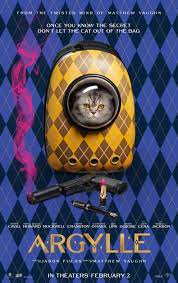
ARGYLLE
UK/US, 2024, 140 minutes, Colour.
Bryce Dallas Howard, Sam Rockwell, Henry Cavill, Bryan Cranston, Catherine O'Hara, Arianna DeBose, Dua Lipa, Richard E.Grant, John Cena, Samuel L.Jackson, Sofia Boutella, Louis Partridge, Ben Daniels.
Directed by Matthew Vaughn.
Has there been any research done about film fans who decide that they are against a film before they see it, still determinedly actually pay for their ticket, then spend a great deal of their time lamenting about the time wasted in watching the film and devoting more time and energies to badmouthing it, especially on social media, and on movie blogging sites? The immediate response to Argylle would be a good case in point. A great deal of social media time and space devoted to lambasting it.
The accompanying question for discernment would be: why not look at the cast and the director, discern that it would be an action show, espionage, probably a lot of spoof, and, with the history of the director, lots of colour and over the top action: give it a try. There would be quite a number of things to enjoy. And, that is probably the point, Argylle was made for enjoyment rather than for minute critical analysis.
Matthew Vaughn has had an interesting career, from the gangster Layer Cake, X Men, Kick Ass, the Kingsman series. And, this time he has had a $200 million budget. A lot of it up there on the screen in colour, special effects, spectacular action sequences.
The basic idea is enjoyable, Bryce Dallas Howard is Elly Conway, a rather mousy writer of spy thrillers. After a signing she is actually whether like Frederick Forsyth, John Le Carre, she is a spy herself! But, soon she does get herself into spy situations, a scruffy fan on a train, Aidan (Sam Rockwell enjoying himself all the way through) revealed through as many fight variations you can have on a moving train, to be a spy, reader of all Elly’s novels, out to protect her.
We have already seen part of one of her novels in action, with Henry Cavill as her muscular hero (despite that awkward Mohawk hair style), in action in Greece, with his tough associate, John Cena, an agent killed, and an unsatisfactory to Elly’s novel. And, Argylle will reappear throughout the film, in Elly’s eyes alternating between Argylle and Aidan.
While Elly’s mother, Catherine O’Hara, is keen to help her daughter with her writing and plot development, we discover the malevolent influence of the renegade Directory the, Bryan Cranston. Plenty of star power in this film, including Oscar-winner Arianna DeBose as an IT expert spy, Samuel L.Jackson as the retired head of the CIA, Sofia Boutella as an exotic mastermind.
Maybe by about a third of the way through or more, there is the temptation to think that this is perhaps a bit more routine than hoped for. But, then the twists start. And then twist on twists! And, the spending of the budget on big action sequences, the audience thinking that one that involves all kinds of smoke and technicolour clouds isn’t bad, but then there is the ice-skating on an armaments floor covered in gasoline, a number of the spectacular leaps and action shots during the skating, some tension in the revelation of who is spying on whom, and a desperate fight interrupting the sending of an important file, a surprise rescue and a final explosion.
This is rather a different role for Sam Rockwell and he seems to relish it. And, a bit more admiration for Bryce Dallas Howard by the end – and, as she grows older, she will enjoy sitting down with her grandchildren to watch it again!
- The films of Matthew Vaughn? Heroes and superheroes? Reality and fantasy? Action? Colour? Effects, action?
- The big budget, the strong cast, the action sequences, choreographed, the special effects, extravagant? The overall effect? “Mindless entertainment”?
- The introduction, the episode in Greece, Henry cavill as Argylle, in action, in the club, the dancer, seductive, explosions, the revelation about controls and the Directory, the glimpse of the Director, the death of the agent in the car, and the dancer scooped by John Cena as he drank his coffee?
- And the revelation that Argylle was a character, Elly Conway as the author, the series of books over five years, bestsellers, the book signing, the fans, asking whether she was a spy like Frederick Forsyth and John Le Carre? Her being quiet and demure, mousy?
- Her relationship with her mother, the phone calls, the discussions of the plot, the mother’s contributions, wanting to come to see her to discuss the developments?
- The train sequence, Aidan sitting in the seat, hair, suspicious, reading Argylle, the discussions, his being a spy, the consequent mayhem, the fights all through the train, rescuing Elly?
- The revelation of the Directory, Rogue agency, Ritter as director, his manner, treatment of his underlings, his rifle, shooting? His wanting to get Elly? The revelation about Elly, the stories paralleling reality?
- The narrative of the plot, comic book, images of Argylle mixing with Aidan during the fights? Argylle and his advice to Elly?
- The importance of Alfie the cat, his appearance, bond with Ellie, her carrying him everywhere, his being in danger, Aidan’s allergy? His part in the heroic action? The discovery of the actual Alfie, in France, Samuel L.Jackson, the visit, the explanation of Pinot Noir, yet his complete set up in France, in the past with the CIA? His determination to unmask and capture Ritter?
- The twists? Dramatically effective? Tantalising? A further twist and revelations? Aidan telling Elly that she was a top agent, her disbelief? Gradual returning of memories? Her mother’s arrival and the truth about her mother, psychologist, the capture of Elly, transforming her character? Her father, Barry – and his threatening Elly, Ritter and his control?
- Ritter and his staff, interrogations of the Elly, discovering where Alfie was? Elly rediscovering her past skills?
- Aidan, his roles in the past, his love for Elly, overhearing him, sense of betrayal? Issues of trust?
- The visit to the Keeper of Secrets, the background of Bakunin, his code, Ritter wanting it, the killing of Bakunin, the interaction with the Keeper of Secrets, her court, socials, Aidan and Elly dancing, not drinking, having possession of the code?
- The buildup to the confrontation, Ritter and his forces, Elly, in the dress, her wig, transformed? Going into action, the gasoline on the floor, the troops, the memories of her skating, the accident, but her skills, getting the knives escapes, the choreographed skating, the aerial manoeuvres? The buildup with the smoke, the variety of colours, a technicolour extravaganza?
- The irony about the psychologist, Aidan shooting her, the bullet proof vest, her reappearing, Aidan and Ellie trying to transmit the code to Alfie, his watching the sports, the interrupted transmission, the fight, the psychologist and her control, Ellie trying to defeat Aidan? The arrival of the agent (in the background story of the experiments, trajectory of bullets, life saved)? Her getting rid of the psychologist? The successful transmission?
- Argylle and his reappearance? In the novels? His being a James Bond style character? The atmosphere of this kind of international espionage throughout? The irony of the transformation of the mousy author into the super agent? And the romance? And the books?
May December
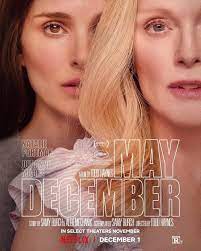
MAY DECEMBER
US, 2023, 117 minutes, Colour.
Natalie Portman, Julianne Moore, Charles Melton, Elizabeth You, Gabriel Chung, D.W.Moffett.
Directed by Todd Haynes.
May December is a phrase that indicates a relationship between a younger person and an older person – with the note, that the older person is considerably older. This film is based on an actual case in Washington State in the 1990s, a married woman with children and her relationship with a 12-year-old. In fact, the woman went to jail, gave birth to a child in prison, and, when released, married the boy.
However, this film does not focus on the 1990s except in retrospect, in memories, in judgements. Rather, the setting is 24 years later, the couple still married, now with three children, one of them graduating from high school. Which means then that an audience will have a point of view on underage sexual relationships, the law, crime and punishment. However, what the film is interested in is the aftermath, what was the effect of the relationship, what was the effect of the marriage, now almost a quarter of a century later?
The occasion for this story is the decision of a company to make a movie about the woman, Gracie (Julianne Moore). A well-known actress Elizabeth (Natalie Portman), comes to town to be with Gracie, to glean all she can that will enhance her performance. In one sense it is perfectly normal for this kind of research. On the other hand, there are all the personal relationships, the probing of the past, sensitivities. But, the way that Todd Haynes, a long-time director of women, Julianne Moore in Safe and Far From Heaven, with such productions as Mildred Pierce, Carol, introduces Elizabeth, we are wary of her, her motivations, professional approach, personal approach and insinuations.
There are frequent scenes of the two women together, especially looking together into a mirror, reminiscent for film buffs of the photos and posters for Ingmar Bergman’s 1960s Persona, the persons, the masks…
And, significantly, there is Joe, the boy in question, now husband and father, played by Charles Melton.
While the screenplay is well-written, dramatic interactions, emotional crises, a strong sequence where a cheeky kid in a class asks the actress about performing sex scenes and she gives quite an intense reply about the process, the detachment, the involvement, the feelings. The way that the audience will understand each of the characters here is often by their body language, their looks, movements, the ways they suggest the inner emotions for the audience to interpret.
It has been remarked that emotions can be buried deep. And, this is the case for the central characters and it is over to the audience to interpret the words and actions to explore these emotions.
However, perhaps the most accessible character is Joe, who is the character who intrigues. And an often warmly striking performance from Charles Melton. Audiences are used to adult predators, used to performers who also perform in real life. But here is Joe, the history of the relationship, his age and inexperience, the marriage, the children, his decades of being husband and father, and the audience wondering how he is still lost in his past, coming to terms, not coming to terms, needs, hopes, love for his children, trying to be supportive of his emotional wife, often allowing himself to be manipulated by her .
The musical score, pounding at times, his adaptation of Michel Legrand’s score for the British film, The Go-between.
The action in May-December is very much December, time passing, the effects of what happened in May, how much for good, how much for ill.
- The title, relationships, older and younger, considerably older?
- The screenplay based on an actual case, the 1990s, the older woman, the schoolboy, the relationship, the law, in prison, giving birth in prison, out of jail, the couple marrying, more children, the passing of the decades?
- Audience judgements about the issue, moral, legal? The important aspect of the film is understanding what happened in the past, realising that decades had passed, the consequences of the initial experience for Gracie, her family, for Joe?
- The town, homes, streets, beaches, school? Authentic American atmosphere? The musical score (the adaptation from the film, The Go-Beetween)? Highly dramatic and pounding?
- The situation, the company making the film, Elizabeth coming to the town, to get to know Gracie, to learn, background for her performance? The motivations? Status as a well-known star? Her personality, initially tentative with Gracie, the interactions, listening, observing, standing with Gracie at the mirror, Gracie applying the make up, the touches of intimacy? The coming to meals, meeting with Joe, the children? Intentions, infiltrating the family?
- Gracie, age, experience, her former husband, willing to be interviewed, his version of the story, his relationship with his children? Gracie and her relationship with Joe, husband and wife, Joe as father? Her relationship with her older children? With her children with Joe? The scene of getting the address for the graduation? Charlie and his moods?
- The scene at school, Elizabeth and celebrity, the provocative question about filming sex scenes, her intense reply, stage by stage of the experience, detachment, technical aspects, feelings? The audience having this in mind for the sequence with Joe? The daughter and her negative reaction to Elizabeth’s answer?
- Joe, his age, casual work, his hobbies, the plans, explanation to Elizabeth, the skills? Relationship with his children, with Charlie on the roof, the marijuana, his first time, his relationship with his children? The relationship with Gracie, looking after her, the jobs, her taking him for granted but loving him?
- Joe, the past, audience trying to understand, knowing what happened, looking at Joe, his body language, listening to him? Sympathy for him? The encounter with Elizabeth, her being seductive, his response, the sexual encounter? The aftermath?
- The daughter coming home, the airport scene, family together, preparation for the graduation, the graduation scene, the whole family present?
- Elizabeth, the encounter was Gracie’s older son, insinuations, requests for the job as a music supervisor?
- The effect of the visit, Elizabeth so often present in the house? Gracie and her becoming wary? And how she was going to be portrayed in the film? The growing sense of alienation? Elizabeth leaving?
- In the future for the children, going off to college, leaving home? The future of Gracie and Joe?
How to Have Sex
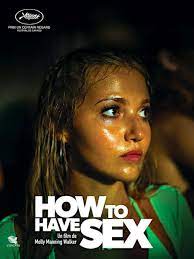
HOW TO HAVE SEX
UK, 2023, 93 minutes, Colour.
Mia McKenna-Bruce, Lara Peake, Enva Lewis, Samuel Bottomley, Shaun Thomas.
Directed by Molly Manning Walker.
There can be many responses to the straightout, rather blunt title. There are those who are pruriently curious – but very quickly they would lose interest. The those who might think this an educational documentary – and, in some ways it is, a docudrama about school leavers, rituals of holidays and freedom, letting go. But, many might suspect – and, of course, this is true at the end – the meaning of the title is actually: How Not to Have Sex.
This film has made quite an impact in the UK but, especially in festivals around the world. It has received to date 43 awards and nominations, including winning the prestigious section at Cannes, Un Certain Regard. Molly Manning Walker has received awards and nominations for her writing and direction. Mia McKenna-Bruce has also won awards for her central performance as Tara.
The target audience is teenage, the central characters here aged 16. And, the focus is on the girls, boys there, in the background, some moments in the foreground, but this is the girls’ story, especially Tara’s. They go to Greece, it is an adventure, sense of freedom – and the three are very much into the boisterously extroverted partying (the first part of the film may not appeal to introverts, that is for the last part, the meaning of the film). The first half hour of the film is almost non-stop partying, noise, music, adolescence making loud whoopee, so to speak.
Tara’s two friends, Skye and Em, enthusiastically urge Tara on, especially in terms of sexual experience. However, Skye is friendly but not particularly empathetic. Em, on the other hand, a clever student at school, is alert to Tara’s feelings and show some sensitivity.
The two boys at the centre of the film share in the boisterousness, Paddy, Samuel Bottomley, seems fairly straightforward. On the other hand, Badger, Shaun Thomas, is multi-tattooed, drives a van, blonde tints in his hair, liking Tara, involving her in some raucous behaviour, but, more sensitive to her.
Parents are merely mentioned, some communication by phone and text, otherwise absent.
The director is quite reticent in dramatising the key sexual encounter at night on a beach. The film quietens down, focuses on Tara, wandering, retiring to her room, rather bewildered, a 16-year-old who thought she might know everything finding that she does not know much at all about herself, sexuality.
Which means that while the “Spring Break” shenanigans continue, the film focuses on Tara, alone, supported by Badger, trying to resist another encounter with Paddy, and everyone packing up to go home, Skye and Em having had the holiday that they were anticipating, but Tara, not knowing how to react, sometimes playing up to the expectations, but still upset in her own inner life.
Will the target audience just respond to the partying or think through Tara’s experience? And how would this film be helpful for parents, teachers, counsellors?
- The title? Straightforward? Ironically negative?
- British perspective? Students, girls, boys, the absence of parents except by phone and text?
- End of academic year ritual, holidays together, resorts, letting go, sense of freedom, drinking, flirting, sex, drugs? Boisterous extroverted activities?
- The Malia setting, Greece for holidaymakers, the British? The age group, studies and exams, success and failures, further education, decisions about work and life? Letting go for the holiday?
- The boisterous scenes, the partying, noise, energy, one party after the other?
- The three girls, their friendship, the focus on Tara? Arrival, wanting the pool-view room, Tara persuading the receptionist? Enjoying the luxury, sunbaking, swimming? The characters, their age, Tara and her uncertainties, not knowing what to do in life, virgin, outlook on sex? Skye, more outgoing, dominating? Em, relationships, friendship with girls, straight A’s in exams, prospects?
- The behaviour, the encounter with the boys, the activities, the drinking, Paddy, straightforward looking, behaviour? Contrast with Badger, tattoos, hair, van driving? The interactions with the girls? Skye and Em urging Tara?
- The episode on the beach, Tara and Paddy, going into the water, her uncertainties, expectations, awareness at 16, the sexual encounter, the film not focusing on the detail? The aftermath, her wandering, her staying more by herself, the reaction of her friends?
- Badger, more sensitivity towards Tara, wanting to walk home, stay with her, listen, attentive?
- Paddy, not noticing Tara, not appreciating her feelings, the return to the bedroom, Badger seeing them in the bed, his concern?
- The effect on Tara, what she was wanting, what she was expecting, what actually happened, a lack of experience in dealing with what happened, wanting the time alone, Badger letting her be quiet? The depth of feelings, wanting time to reflect, yet not having the maturity, bursting out, playing up to the gallery at times?
- The end of the holiday, Em and her success with exams, her sensitivity towards Tara, especially listening, alert, the airport? Skye and her lack of awareness?
- The target audience, especially girls, identifying with the characters, the situations, the dilemmas, the moral issues, coping and not? Parents, teachers, counsellors?
.
Mean Girls/ 2023
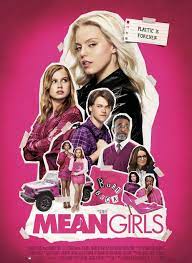
MEAN GIRLS
US, 2024, 111 minutes, Colour.
Angourie Rice, Renee Rapp, Auli'i Cravalho, Jaquel Spivey, Avantika, Bebe Wood, Christopher Briney, Jenna Fischer, Busy Phillips, Tina Fey, Tim Meadows, Lindsay Lohan, Jon Hamm, Ashley Park.
Directed by Samantha Jayne, Arturo Perez Jr.
The original Mean Girls was an instant success in 2004. It was based on a popular novel, Queen Bees and Wannabes, 2002, by Rosalind Wiseman. Audiences, especially teenage audiences, responded immediately. And the screenplay was written by Saturday Night Live writer and sharply ironic comedian, Tina Fey. It was a star vehicle for Lindsay Lohan, contributed to the career of Rachel McAdams and was a starting point for Amanda Seyfried and Lacey Chabert.
Mean Girls was successfully brought to the Broadway theatre as a musical in 2013. Now, 20 years after the original film, here is the screen version of the musical. Fey and Meadows reprise their 2004 roles – Ms Norbury and Mr Duvall. This time there are some guest cameos, including Hamm as coach, Fischer is the heroine’s mother, Phillips is the mother of the Queen Bee Regina George (Rapp), and, in the final Mathletes’ competition, Lohan is the compere.
Audiences who enjoy seeing the film version of a Broadway musical will go along. However, while it is exuberant, its 2020s, social media, Tik-Tok vibe, as well as franker and coarser language, the question would be how much it would really appeal to the, say, over 30s (or even the over 25s).
It is almost two hours spent in the company of teenagers that many in the audience might want to avoid in real-life, and on the screen.
While the plot is the same, there was something about the meanness in the original film that caught audience attention, dramatic ploys, one-liners, sometimes an almost admiration for the clever meanness. This time, it just seems so often meanly mean.
Australia’s Rice is the young student from Kenya, Cady, eager to go to high school in the US. She is pleasant in the role, at first the victim, then absorbing the meanness of the elitist Plastics clique in the school. On the other hand, Rapp is dominating – completely believably mean and gets everyone’s attention. There are some clever performances from the supporting cast.
Briney (The Summer I Turned Pretty, Daliland) is the charming boyfriend, linking with Cady in Fey’s calculus classes.
There is some truth in an IMDb blog comment, ‘It’s like watching several music videos with a modern mean girls in between’.
A finir del tunel/ At the End of the Tunnel
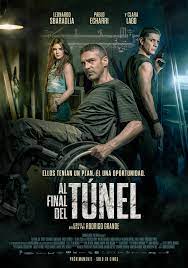
AT THE END OF THE TUNNEL/ A FINIR DEL TUNEL
Spain/Argentina, 2016, 120 minutes, Colour.
Leonardo Sbaraglia, Pablo Echarri, Clara Lago, Federico Luppi.
Directed by Roderigo Grande.
Tunnel of the title is a complex range of tunnels under a building, aiming towards bank falls for a robbery. There are many digging scenes, as expected.
However, the plot is rather different insofar as the focus is on a paraplegic man who lives in the building above the tunnels. He is a loner, an expert on surveillance, and is able to film and record the work of the robbers and their conversations.
A further complication is his advertising space for a lodger and a dancer from a local club coming with her daughter (who hasn’t spoken for two years) and taking up residence. As a drama with the interaction between the dancer and the paraplegic, the film works quite well. Also the issue of the daughter who bonds with the paraplegics dog and even talks to him (and this is recorded).
However, the dancer is the girlfriend of the of the head of the robbery team. And the team is governed by a corrupt policeman. Which all builds up to the intervention to thwart the robbery, taking of money and significant documents, and confrontations all round.
- A bank robbery thriller with a difference? Tunnelling, Joaquin and his paraplegic, Berta and her daughter?
- The confined setting, the opening with the street, the bank, the action in the interiors in Joaquin’s house, the basement, the tunnels? The finale in the streets? The musical score?
- The setting up of the robbery, the group digging, their relationships, the control of Guttman, the revelation of his police connections, his motivation, the documents, the robbers and their experience, money? The detail of the digging, the maps, mistakes, the using of explosives? Cautions, the roof? The interactions while digging?
- Joaquin, paraplegic, his background, loner, his basement, computers and surveillance, his hearing the robbers, the cameras, the audio? His following the digging? The effect on him, motivations, money issues?
- The advertisement, Berta and Betty, Berta and her background, dancer, Betty not talking for two years, moving in, dominating, Joaquin and his response? The discussions with Bert, his past, relationships? Her past, boyfriend?
- Joaquin, realising she was a plant, treatment of her? Her taking turns, injections? Berta and her daughter, her concern about her not speaking? Betty, at home in the house, the attraction towards the dog, bonding with him, talking with him and Joaquin recording this, Berta’s reaction?
- The progress of the digging, the deadlines, the decisions, Guttman and his control?
- Betty, going down, taking the watch? Joaquin bringing her up again? Reassurance?
- Joaquin, going down, taking the money, the documents? Hiding?
- The water, flooding the tunnel, the drowning of the robber, her asking to be saved, Joaquin putting on the cover? The others, the empty boxes? The increasing flood, Joaquin’s basement?
- The authorities arriving, Guttman and his presence, curbing the flood, the police interrogating Joaquin, the search? Guttman arriving, giving his phone number? The robbers arriving, the confrontations, guns, wanting the truth? Joaquin and his stories, Betty appearing, finding Bert?
- The technique of Joaquin setting them against each other, the target, accusing it of collusion, betrayal, the producing of the watch? The shootings? The leader, his being shot? Guttman, the hold over each other, Joaquin and the documents? Giving Guttman the bag, the crash, the body in the car trunk, the explosion?
- The finale, the three together, the money, a future?
Sleeping Murder/ 1985
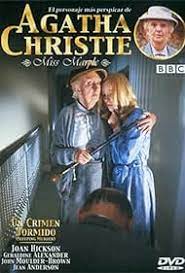
SLEEPING MURDER
UK, 1987, 102 minutes, Colour.
Joan Hickson, Geraldine Alexander, John Moulder-Brown, Frederick Treves, Jean Anderson, Terrence Hardiman, John Bennett, Jack Watson.
Directed by John Davies.
Agatha Christie’s novels were enormously popular in the 20th century, many film and television series made. And, they continue into the 21st-century, new Poirot films, continued streaming screening of Miss Marple stories and those of Poirot.
While Angela Lansbury and Margaret Rutherford did portray Miss Marple, the main screen presentations were by Joan Hickson, Geraldine McEwan, Julia Mackenzie. It is interesting that the stories with the latter two Miss Marples was somewhat updated, the films with Joan Hickson had the post-war atmosphere, the late 1940s, the 1950s, life in the village, costumes and decor, vehicles, religious observance, traditional values…
This Miss Marple story is somewhat different. Usually there is a police Inspector who dislikes the interference of Miss Marple but then has to work with her to solve the crime. In this film, the crime happened 20 years earlier, the disappearance of a young woman, allegedly going off with a male and not heard of afterwards. As a young couple, who have spent some time in New Zealand, drive along a country road, the wife sees a mansion and feels that it is just right for them. Which leads to some sense of déjà vu, re-experiencing some horror from the past.
As the mystery unfolds, the couple do the detective work themselves along with Miss Marple. There are several possibilities for murder, three men in the village who are investigated, and the half brother of the disappeared woman, the local doctor. Then, just as a witness is to help solve the case, she is murdered and, at last, the police do intervene.
It is interesting that in this particular story, the murderer is in plain sight.
- The popularity of Agatha stories? Miss Marple? The various actresses? Joan Hickson?
- The Joan Hickson movies, closer to the novels, the post-war settings, the English village, costumes and decor,, manners and proprieties? The musical score?
- The title, advice about the past, let sleeping dogs and murders lie? The dangers of uncovering the past?
- Miss Marple, the connection with her novelist nephew, his friends and their house? The reputation? Investigations, questions, going to shops, getting information? Confidante of the couple?
- A different Miss Marple story, the couple doing the investigations, her help, police arriving only after the murder towards the end?
- Giles and Gwenda, newly married, New Zealand, her background, India, gradual revelation of time in England? The secrecy about events and her father? Driving, her seeing the house, attracted, the tour with the agent, a scream at the top of the stairs? Foreboding? Redecorating, wanting the door and later discovering it was there, wanting steps and discovering the previous steps? The wallpaper, the flower patterns? Her becoming edgy, the invitation to London?
- Miss Marple, her nephew, his critical wife, going to the theatre, The Duchess of Malfi, Gwenda screaming, the words, the later repeating? The embarrassment, her worrying whether she was going mad?
- The advertisement for information, the doctor, his invitation, half brother to the missing woman, his being a doctor in the town, clients, many years, his visits, the letters from Helen, loss of contact? His benign interest and help?
- The uncovering of the real situation, Gwenda, her father in India, widowed, the voyage home, the encounter with Helen, marrying her, a year, suspicious behaviour, the story of her running off with someone, disappearing? The effect on the father, mental deterioration, institution, suicide? The visit to the institution to find out more?
- The men friends, the lawyer in the town, engagement, his being in India, the break off, the return, working in the town for 20 years? Morning tea with his mother, her views on Helen?
- The salesman, criticisms of him as loud, tracking him down, the couple pretending to hire a bus, the discussions about Helen, his being sorry for her, his flashy car and the reports of flashy cars?
- The Colonell and his wife, in Northumberland, the visit, the wife suspicions, Gwenda going back for the hearing, the conversation with the Colonel and hearing the truth?
- The servants, Miss Marple in the interviews, the flashbacks to what happened on the night, the maid at the pictures, her covering, Helen’s voice and not being afraid?
- The maid, her husband, seeing the ad, writing the letter to the doctor, coming to give testimony, her motivations, some money? In the fields, strangled?
- Help of the gardener, his memories of the past?
- Waiting for the maid, Giles and Gwenda and the doctor, her being discovered murdered, the police inspector?
- Miss Marple, her theories, the writing on the notes and checking out the authenticity, talking with the servants? Calling the inspector aside, the plan?
- The mysterious arrival, the threat to Gwenda, the hose, the doctor and his unmasking? His motivations, possessiveness, controlling Helen, the story of the tennis net cut, her foot injury, the reputation of the other men coming from the doctor, also the story is about her father, his actually fostering the delusions of the father?
- Satisfactory murder mystery, the past, detection and investigation, unmasking?
Amish Stud: The Eli Weaver Story
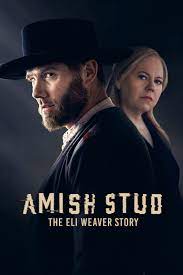
AMISH STUD: THE ELI WEAVER STORY
US, 2023, 85 minutes, Colour.
Luke MacFarlane, Kirsten Bangsness, Miranda MacDougall, Brent Stait, Mark Krisko, Claire Filipow, Karolina Cubatt.
Directed by Stacey N..Harding.
There is a certain curiosity when the film has Amish in its title. Memories of Peter Weir’s classic, Witness.
However, this is a different kind of story. And it is based on actual events and characters.
The title indicates the theme of the film. It was made for television, a Hallmark production, the company noted for its very popular entertainments for a wide television audience. And this is the case with the treatment here.
Luke MacFarlane (Bros) plays Eli Weaver, brought up in the Amish community, rebellious attitudes, moving out and experiencing a freer life, drinking, gambling, relationships with women. However, he returns to the community, asking for forgiveness and reconciliation. And he is accepted, marries a young woman who has been long infatuated with him, has children, but it is an unhappy marriage, he making sexual demands on her that seem not in keeping with Amish teaching, setting up a business with assistance from outsiders, keeping a mobile phone, keeping up contacts.
Early in the film, it is established that she has been killed. He is the main suspect but he has an alibi, out fishing at the time with a friend. When the police want to investigate and send detectives, the Amish leadership close up, stating that they want to solve the issues within the community.
There are flashbacks to the life of the family, the hardships of the wife, the brutality of Eli Weaver, his lies, his double standards.
The sister of the dead woman is suspicious, voices her suspicions, searches for evidence, eventually finding a diary that a psychiatrist had advised the woman to keep. In the meantime, Eli Weaver makes contact with the women with whom he had liaisons, some defending him, some remembering the past. Most of them had supplied him with money. However, the key woman is his Sec at his company, infatuated with him, married with a rather placid husband at home, flattered by Weaver’s attentions, she believes he is in love with her and goes along with a plan to murder his wife, doing online searches for poisons and ways of shooting, his giving her a rifle, leaving home, going to the house, killing his wife.
She is arrested, not helped by Weaver, in court, found guilty, an outburst against him. He then is tried for complicity, is sentenced to jail, continues to exercise his charm in prison.
The factual information at the end of the film indicates that he is due for parole in 2024.